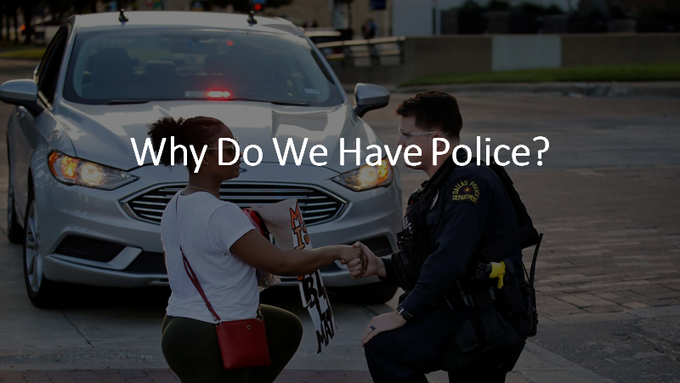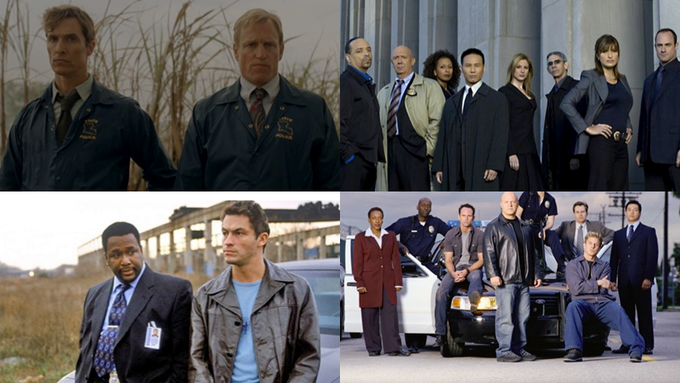
If you were teaching the class, what would be the most important topic that an introductory policing in class in 2021 should address?
Join me at noon, cst, to discuss
#CRJ201 #AmericanPolicing #MoraineValley
Join me at noon, cst, to discuss
#CRJ201 #AmericanPolicing #MoraineValley
Good afternoon, Policing fans, critics, supporters, activitists, students, officers, rookies, and future men & women behind the badge. Today is an introduction to the topics we will be covering the next 16 weeks in American Policing
#CRJ201 #AmericanPolicing #MoraineValley
#CRJ201 #AmericanPolicing #MoraineValley
I'll cover the basics of the course, introduce the course syllabus, and highlight some of the topics of discussion.
I hope you follow along! #MoraineValley #CRJ201
I hope you follow along! #MoraineValley #CRJ201

I am so excited to be back teaching American Policing. It is such an important time to better understand the profession, I'm really looking forward to sharing this semester with all of you.
#MoraineValley #CRJ201



#MoraineValley #CRJ201




Let me learn a little bit about you, as we start this class,
I want to learn about the police because ...
#MoraineValley #CRJ201
I want to learn about the police because ...
#MoraineValley #CRJ201
We are going to cover a wide range of topics, it is my goal to bring you the critical eye to learn about the profession, but what makes an effective officer
#MoraineValley #CRJ201
#MoraineValley #CRJ201

In your current opinion, the most important trait of an effective police officer is ...
#MoraineValley #CRJ201
#MoraineValley #CRJ201
Glad to e-meet you! I'll be your instructor for the next 16 weeks. I got my start in Corrections, worked as a dispatcher, then a patrol officer. Now I work in training & at @morainevalley
(Pardon the selfie, my office mates only have paws)



(Pardon the selfie, my office mates only have paws)




So what IS the #AskTwoFox15 project? Please meet my good friend @TwoFox15
of @cfseubc
Each week, students will pose their policing related questions to Cpl. Clark
#MoraineValley #CRJ201
of @cfseubc
Each week, students will pose their policing related questions to Cpl. Clark
#MoraineValley #CRJ201

I pin each week's tweet to the top of my account. Students can also find the link on the homepage. Cpl. Clark will select one question a week to answer in a video response!
#MoraineValley #CRJ201
#MoraineValley #CRJ201

So where do you get started in class? I recommend reading through (maybe even printing out) the syllabus!
The syllabus is the contract that I've put together to help you do well. If you do the work, you will do well!
#MoraineValley #CRJ201
The syllabus is the contract that I've put together to help you do well. If you do the work, you will do well!
#MoraineValley #CRJ201

So let's get started! Jumping into Chapter 01: In your opinion, what do you think is the most important role of police in society?
#MoraineValley #CRJ201 #RoleOfPolice
#MoraineValley #CRJ201 #RoleOfPolice
So let's get started! Jumping into Chapter 01: In your opinion, what do you think is the most important role of police in society?
#MoraineValley #CRJ201 #RoleOfPolice
#MoraineValley #CRJ201 #RoleOfPolice

What do I hope to achieve over the next 16 weeks in our live twitter discussions?
#MoraineValley #CRJ201 #RoleOfPolice #PolicingGoals
#MoraineValley #CRJ201 #RoleOfPolice #PolicingGoals

The police have multiple responsibilities involving controlling crime, maintaining order, and providing miscellaneous services to the public
#MoraineValley #CRJ201 #RoleOfPolice #PolicingGoals
#MoraineValley #CRJ201 #RoleOfPolice #PolicingGoals

A day in the life of a police officer: via @DenverChannel
#MoraineValley #CRJ201 #RoleOfPolice #DayInTheLife
#MoraineValley #CRJ201 #RoleOfPolice #DayInTheLife
THINKING CHALLENGE: Research your local police department mission statement.
In your opinion, which should be the priority in their outlook?
#MoraineValley #CRJ201 #RoleOfPolice
In your opinion, which should be the priority in their outlook?
#MoraineValley #CRJ201 #RoleOfPolice
The President’s Task Force on 21st Century Policing as a useful framework for understanding the basic principles of good policing
cops.usdoj.gov/pdf/taskforce/…
#MoraineValley #CRJ201 #RoleOfPolice
cops.usdoj.gov/pdf/taskforce/…
#MoraineValley #CRJ201 #RoleOfPolice

THINKING CHALLENGE: In your assessment, The President’s Task Force on 21st Century Policing is ...
#MoraineValley #CRJ201 #RoleOfPolice
#MoraineValley #CRJ201 #RoleOfPolice
THINKING CHALLENGE: But that prompts an interesting question.
How do/should we measure "good" policing?
#MoraineValley #CRJ201 #RoleOfPolice
How do/should we measure "good" policing?
#MoraineValley #CRJ201 #RoleOfPolice
Calls for service are the most common calls that most police departments receive, however when most Americans think of the police, they envision the crime fighter image
#MoraineValley #CRJ201 #RoleOfPolice
#MoraineValley #CRJ201 #RoleOfPolice

THINKING CHALLENGE: What is one of the biggest myths about policing?
#MoraineValley #CRJ201 #RoleOfPolice
#MoraineValley #CRJ201 #RoleOfPolice
I strongly recommend following @PoliceLawProf
and reading this piece: 8 Things We Still Get Wrong About Policing
time.com/3859400/polici…
#MoraineValley #CRJ201 #RoleOfPolice
and reading this piece: 8 Things We Still Get Wrong About Policing
time.com/3859400/polici…
#MoraineValley #CRJ201 #RoleOfPolice

There are several reasons that the crime-fighter image is maintaining in the American public conscience
#MoraineValley #CRJ201 #RoleOfPolice
#MoraineValley #CRJ201 #RoleOfPolice

THINKING CHALLENGE: Do police television shows support or hinder American understanding of the police role?
#MoraineValley #CRJ201 #RoleOfPolice
#MoraineValley #CRJ201 #RoleOfPolice
Does the news media support or hinder American understanding of the police role?
#MoraineValley #CRJ201 #RoleOfPolice
#MoraineValley #CRJ201 #RoleOfPolice
What is your response from this Daily Show piece featuring Trevor Noah that 'cop shows lie'?
#MoraineValley #CRJ201 #RoleOfPolice
#MoraineValley #CRJ201 #RoleOfPolice
People want an effective police but how that looks varies from community to community
#MoraineValley #CRJ201 #RoleOfPolice
#MoraineValley #CRJ201 #RoleOfPolice

So if most Americans believe in effective policing, why is there so much discord about how that is accomplished?
#MoraineValley #CRJ201 #RoleOfPolice
#MoraineValley #CRJ201 #RoleOfPolice

Can we police a democratic society?
Democracy and the police means that the police are both answerable to the people and accountable to the rule of law
#MoraineValley #CRJ201 #RoleOfPolice
Democracy and the police means that the police are both answerable to the people and accountable to the rule of law
#MoraineValley #CRJ201 #RoleOfPolice

Making sure that the police are responsive to the public but are not used for improper purposes is a major challenge for the American police.
#MoraineValley #CRJ201 #RoleOfPolice
#MoraineValley #CRJ201 #RoleOfPolice

The President’s Task Force made a number of recommendations to ensure that the police are responsive to the people they serve
cops.usdoj.gov/pdf/taskforce/…
#MoraineValley #CRJ201 #RoleOfPolice
cops.usdoj.gov/pdf/taskforce/…
#MoraineValley #CRJ201 #RoleOfPolice

"Good" policing requires legitimacy that the people they serve have trust and confidence in them
#MoraineValley #CRJ201 #RoleOfPolice
#MoraineValley #CRJ201 #RoleOfPolice

THINKING CHALLENGE: All of the below are important, but in your assessment, which is most critical for police to establish legitimacy?
#MoraineValley #CRJ201 #RoleOfPolice
#MoraineValley #CRJ201 #RoleOfPolice
Procedural justice is now recognized as an essential guiding principle for good policing
#MoraineValley #CRJ201 #RoleOfPolice
#MoraineValley #CRJ201 #RoleOfPolice

Procedural justice holds that in dealing with an organization, people are concerned not just with what happens to them but also with HOW they are treated
#MoraineValley #CRJ201 #RoleOfPolice
#MoraineValley #CRJ201 #RoleOfPolice

As a citizen, have you had an experience with the police that IMPROVED your impression of the police & their role in society?
#MoraineValley #CRJ201 #RoleOfPolice
#MoraineValley #CRJ201 #RoleOfPolice
As a citizen, have you had an experience with the police that DETERIORATED your impression of the police & their role in society?
#MoraineValley #CRJ201 #RoleOfPolice
#MoraineValley #CRJ201 #RoleOfPolice
As an officer, have you had an experience with the police that IMPROVED your impression of society & the nature of human beings?
#MoraineValley #CRJ201 #RoleOfPolice
#MoraineValley #CRJ201 #RoleOfPolice
As an officer, have you had an experience with the police that DETERIORATED your impression of society & the nature of human beings?
#MoraineValley #CRJ201 #RoleOfPolice
#MoraineValley #CRJ201 #RoleOfPolice
Research consistently finds that people notice how they are treated by police officers and that it makes a difference to them
#MoraineValley #CRJ201 #RoleOfPolice

#MoraineValley #CRJ201 #RoleOfPolice


This means the difference between getting a traffic ticket and how the officer acted. For example:
~being rude,
~being polite,
~not answering the person’s questions,
~explaining the reason for the stop
#MoraineValley #CRJ201 #RoleOfPolice
~being rude,
~being polite,
~not answering the person’s questions,
~explaining the reason for the stop
#MoraineValley #CRJ201 #RoleOfPolice

There are many ways in which the police can build trust and legitimacy.
#MoraineValley #CRJ201 #RoleOfPolice
#MoraineValley #CRJ201 #RoleOfPolice

Respectful policing includes the police introducing themselves, explaining the reason they are there, listening to people, and answering their questions
#MoraineValley #CRJ201 #RoleOfPolice
#MoraineValley #CRJ201 #RoleOfPolice

Building trust and legitimacy requires that a police department have a workforce that is representative of the community, in terms of race, ethnicity, and gender
#MoraineValley #CRJ201 #RoleOfPolice



#MoraineValley #CRJ201 #RoleOfPolice




Another issue that undermines trust and confidence in the police is that, historically, police departments have refused to admit that they make mistakes
#MoraineValley #CRJ201 #RoleOfPolice



#MoraineValley #CRJ201 #RoleOfPolice




I love being a police officer, but we need reform | Melvin Russell
#MoraineValley #CRJ201 #RoleOfPolice
#MoraineValley #CRJ201 #RoleOfPolice

Openness and transparency involves the police explaining to the public what they do and how they handle certain critical situations, such as domestic violence incidents.
#MoraineValley #CRJ201 #RoleOfPolice
#MoraineValley #CRJ201 #RoleOfPolice

The most dangerous weapon in law enforcement | Brian Willis | @TEDxNaperville
#MoraineValley #CRJ201
#MoraineValley #CRJ201
People want the police to be effective in fulfilling their three major responsibilities:
~controlling crime,
~maintaining order, and
~providing services to the public
#MoraineValley #CRJ201 #RoleOfPolice
~controlling crime,
~maintaining order, and
~providing services to the public
#MoraineValley #CRJ201 #RoleOfPolice

The police perpetuate the crime-fighter image themselves.
They present themselves to the community as the protectors of public safety.
Most important, the crime-fighter image does not represent an accurate picture of the reality of police work
#MoraineValley #CRJ201
They present themselves to the community as the protectors of public safety.
Most important, the crime-fighter image does not represent an accurate picture of the reality of police work
#MoraineValley #CRJ201

THINKING CHALLENGE: Should the Punisher logo / imagery be associated with police work?
#MoraineValley #CRJ201 #RoleOfPolice
#MoraineValley #CRJ201 #RoleOfPolice
THINKING CHALLENGE: Should the Blue Line logo / imagery be associated with police work?
#MoraineValley #CRJ201 #RoleOfPolice
#MoraineValley #CRJ201 #RoleOfPolice
THINKING CHALLENGE: What aspect of modern police work would you like to know more about?
#MoraineValley #CRJ201 #RoleOfPolice
#MoraineValley #CRJ201 #RoleOfPolice
I appreciate ANY / ALL feedback to this discussion. How would you 'grade' my performance in introducing the role of police in society?
#MoraineValley #CRJ201 #RoleOfPolice
#MoraineValley #CRJ201 #RoleOfPolice
Thank you so much for our introductory look at the Role of Police in American Society. Please join me next week for a look at some of the challenges to modern policing
Please forward any questions or comments
#MoraineValley #CRJ201 #RoleOfPolice
Please forward any questions or comments
#MoraineValley #CRJ201 #RoleOfPolice
• • •
Missing some Tweet in this thread? You can try to
force a refresh


















